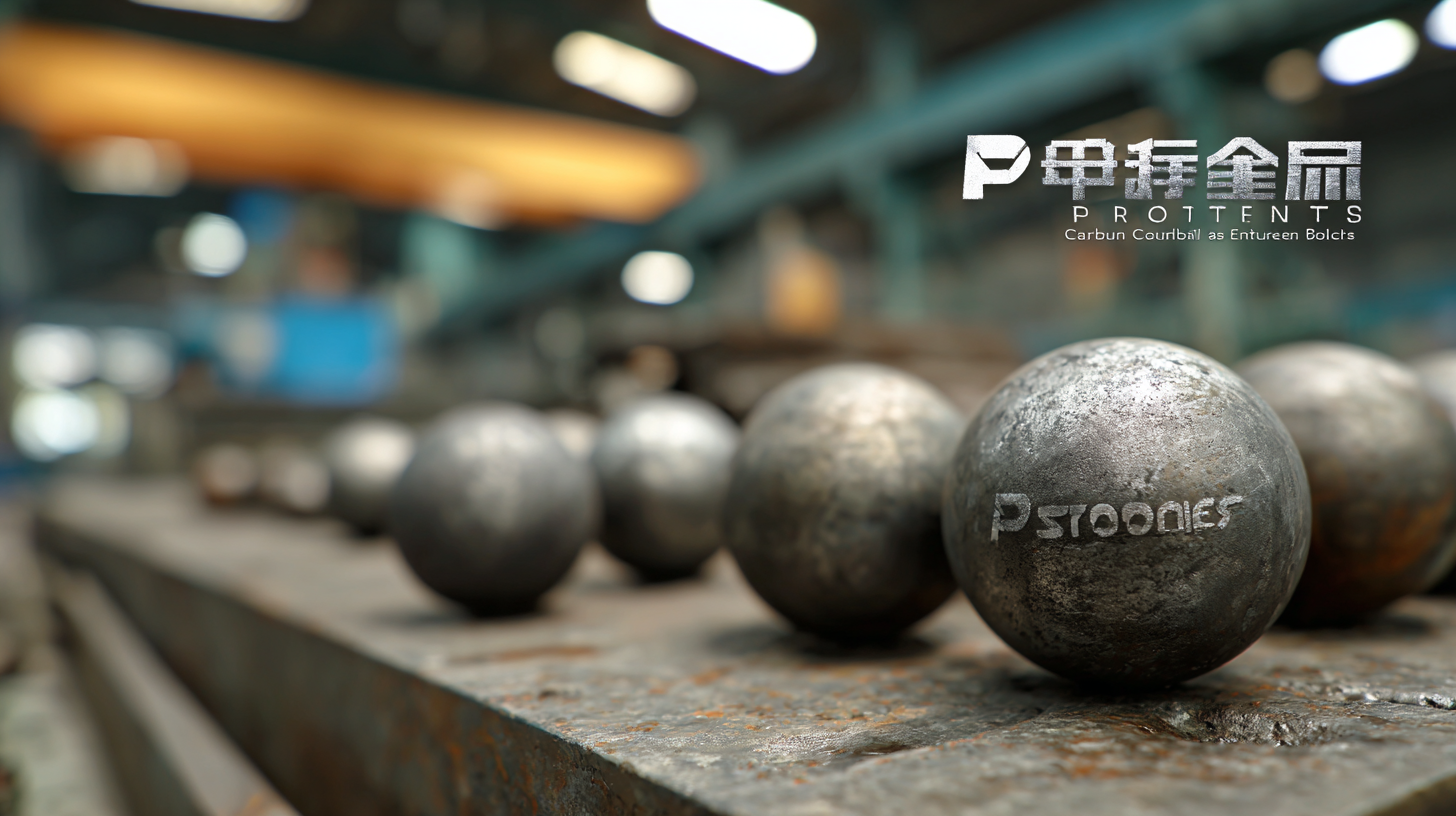
As the global manufacturing landscape continues to evolve, the significance of high-quality materials such as Carbon Steel Ball is becoming increasingly paramount. According to a recent report by Allied Market Research, the global steel ball market is projected to reach USD 4.5 billion by 2027, growing at a CAGR of 4.2% from 2020 to 2027. This growth is largely driven by the expanding automotive and machinery sectors, where carbon steel balls play a crucial role in reducing friction and enhancing performance.

China, as a leading player in the carbon steel ball manufacturing industry, has harnessed advanced technologies and rigorous quality control processes to produce products that meet international standards. In this ultimate guide, we will explore how China's carbon steel ball manufacturers are setting new benchmarks for excellence on a global scale, and highlight the key attributes that make these products indispensable for various industrial applications.
 The rise of carbon steel balls in global markets reflects a dramatic shift in manufacturing efficiency and consumer demand. According to a recent market report by Mordor Intelligence, the global steel ball market is projected to reach USD 9.1 billion by 2026, growing at a CAGR of 5.2%. Factors contributing to this growth include the rising demand for precision components across various industries such as automotive, aerospace, and construction. China's leading carbon steel ball manufacturers are at the forefront of this expansion, leveraging advanced production techniques to ensure quality and competitiveness.
The rise of carbon steel balls in global markets reflects a dramatic shift in manufacturing efficiency and consumer demand. According to a recent market report by Mordor Intelligence, the global steel ball market is projected to reach USD 9.1 billion by 2026, growing at a CAGR of 5.2%. Factors contributing to this growth include the rising demand for precision components across various industries such as automotive, aerospace, and construction. China's leading carbon steel ball manufacturers are at the forefront of this expansion, leveraging advanced production techniques to ensure quality and competitiveness.
Tips for Manufacturers: Invest in innovative manufacturing technologies to enhance the quality and precision of carbon steel balls. Automation and quality control systems not only minimize defects but also improve delivery times, thus increasing customer satisfaction. Additionally, focusing on sustainability practices can attract more environmentally conscious clients, as industries are increasingly prioritizing eco-friendly sourcing.
As consumer preferences shift towards durability and performance, carbon steel balls are becoming indispensable in a wide array of applications. Data from Technavio indicates that the growing automotive sector alone accounts for nearly 40% of global steel ball demand. By adapting to these market trends, businesses can position themselves to thrive in this dynamic environment.
Tips for Buyers: When sourcing carbon steel balls, prioritize suppliers who offer comprehensive technical support and customization options. Ensuring that your supplier adheres to international quality standards will also help mitigate risks associated with product failure in critical applications.
China has emerged as a powerhouse in carbon steel ball manufacturing, leveraging advanced technology and a robust supply chain to offer unparalleled advantages in the global market. One of the key strengths lies in its state-of-the-art production facilities, which utilize cutting-edge machinery and innovative manufacturing processes. This not only enhances the quality and precision of carbon steel balls but also allows for large-scale production, meeting the growing demands of industries worldwide.
Moreover, Chinese manufacturers benefit from a well-established network of raw material suppliers, ensuring a steady and cost-effective supply of high-grade carbon steel. This vertical integration facilitates competitive pricing, making Chinese carbon steel balls an attractive option for businesses looking to maximize their operational efficiency without compromising on quality. Additionally, the focus on research and development enables continuous improvements in product performance, thus solidifying China’s position as a leading player in the carbon steel ball market.
The production of carbon steel balls has seen significant innovations that are transforming the landscape of manufacturing. According to a report from Grand View Research, the global market for steel balls is projected to reach USD 4.5 billion by 2024, with an annual growth rate of 3.6%. These figures emphasize the rising demand for high-quality components in various applications, including automotive, aerospace, and industrial machinery.
China, as the leading manufacturer of carbon steel balls, is at the forefront of integrating innovative technologies in its production processes. Advanced techniques such as precision forging, heat treatment, and automated quality control systems have enhanced both the efficiency and the performance of the manufacturing process. The implementation of Industry 4.0 technologies, including IoT and AI, allows for real-time data analysis and predictive maintenance, resulting in lower operational costs and improved product reliability. It is estimated that companies adopting these technologies can increase their production efficiency by up to 30%, allowing them to meet the escalating global demand while maintaining high standards of quality.
As the carbon steel ball market continues to expand, China's commitment to innovation not only strengthens its position in the global marketplace but also sets intriguing benchmarks for sustainability and technology-driven growth in manufacturing.

China's steel ball industry is experiencing a significant transformation as manufacturers implement sustainable practices to align with global environmental standards. With the production of over 1.2 billion carbon steel balls annually, China's dominance in the market is coupled with a growing commitment to reducing carbon emissions. Recent studies indicate that the sector has started adopting advanced production technologies that can decrease energy consumption by up to 30%, a crucial step towards minimizing its carbon footprint.
Furthermore, a 2023 report from the China Iron and Steel Association highlights that over 60% of steel ball manufacturers are now utilizing recycled materials, contributing to a circular economy model. By integrating sustainable materials and enhancing efficiency, China's steel ball industry not only meets the rising global demand but also responds to the urgent call for environmental stewardship. These efforts are likely to position China as a leader in eco-friendly manufacturing practices, paving the way for a greener future in industrial production.
The carbon steel ball manufacturing industry is witnessing transformative advancements driven by technological innovation and sustainable practices. According to a recent market report from Grand View Research, the global carbon steel ball market is projected to reach USD 21.4 billion by 2025, with a CAGR of 5.3%. This growth is primarily fueled by increased demand in automotive applications and the rising adoption of high-performance bearings, which require precision-engineered carbon steel balls for enhanced durability and efficiency.
China, as a frontrunner in this sector, is leveraging cutting-edge manufacturing processes to meet global standards. The introduction of automation and smart manufacturing techniques is anticipated to optimize production efficiency and reduce waste. A report by ResearchAndMarkets indicates that the integration of Industry 4.0 technologies could improve operational efficiency by up to 30%, focusing on real-time data analytics and predictive maintenance. As manufacturers in China continue to push the boundaries of innovation, the trend towards environmentally friendly practices is also gaining momentum, with an emphasis on reducing carbon footprints throughout the production cycle. This commitment to sustainability aligns with global initiatives aimed at combating climate change, positioning China's carbon steel ball manufacturing as a leader in both quality and environmental responsibility.
| Year | Production Volume (tons) | Market Share (%) | Export Volume (tons) | Average Price (USD/ton) | Emerging Trends |
|---|---|---|---|---|---|
| 2021 | 1,500,000 | 25 | 600,000 | 500 | Sustainability Practices |
| 2022 | 1,600,000 | 26 | 650,000 | 550 | Automation in Production |
| 2023 | 1,700,000 | 27 | 700,000 | 575 | Smart Manufacturing Techniques |
| 2024 (Projected) | 1,800,000 | 28 | 750,000 | 600 | Green Manufacturing Solutions |
